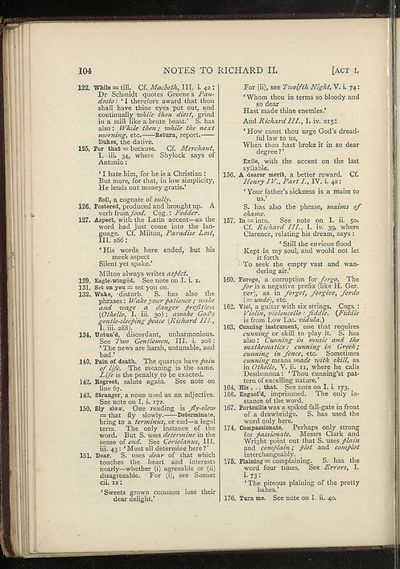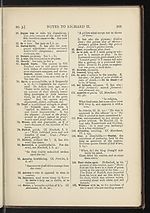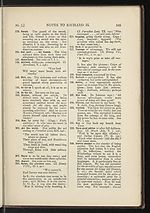Download files
Complete book:
Individual page:
Thumbnail gallery: Grid view | List view

[act 1,
104 NOTES TO RICHARD II.
122. While = till. Cf. Macbeth, III. i. 42 :
Dr Schmidt quotes Greene's Pan-
dosto: ‘ I therefore award that thou
shall have thine eyes put out, and
continually while thou diest, grind
in a mill like a brute beast.’ S. has
also: While then; while the next
morning, etc. Return, report.
Dukes, the dative.
125. For that = because. Cf. Merchant,
I. iii. 34, where Shylock says of
Antonio:
11 hate him, for he is a Christian :
But more, for that, in low simplicity,
He lends out money gratis.’
Soil, a cognate of sully.
126. Fostered, produced and brought up. A
verb from food. Cog.: Fodder.
127. Aspect, with the Latin accent—as the
word had just come into the lan-
Riage. Cf. Milton, Paradise Lost,
I. 266:
‘His words here ended, but his
meek aspect
Silent yet spake.’
Milton always writes aspict..
129. Eagle-winged. See note on I. i. 1.
131. Set on you = set you on.
132. Wake, disturb. S. has also the
phrases : Wake your patience ; wake
and wage a danger profitless
{Othello, I. iii. 30); awake God’s
gentle-sleeping peace {Richard III.,
I..iii. 288).
134. Untun’d, discordant, unharmonious.
See Two Gentlemen, III. i. 208:
‘ The news are harsh, untunable, and
bad.’
140. Pain of death. The quartos have pain
of life. The meaning is the same.
Life is the penalty to be exacted.
142. Regreet, salute again. See note on
line 67.
143. Stranger, a noun used as an adjective.
See note on I. i. 172.
150. Sly slow. One reading is fly-slow
= that fly slowly. Determinate,
bring to a terminus, or end—a legal
term. The only instance of the
word. But S. uses determine in the
sense of end. See Coriolamis, III.
iii. 43 : ‘ Must all determine here ? ’
151. Dear. S. uses dear of that which
touches the heart and interests
nearly—whether (i) agreeable or (ii)
disagreeable. For (1), see Sonnet
cii. X2:
‘ Sweets grown common lose their
dear delight.’
For (ii), see Twelfth Night, V. i. 74:
‘ Whom thou in terms so bloody and
so dear
Hast made thine enemies.’
And Richard III., I. iv. 215:
* How canst thou urge God’s dread¬
ful law to us.
When thou hast broke it in so dear
degree ? *
Exile, with the accent on the last
syllable.
156. A dearer merit, a better reward. Gf*
Henry IV., Part /., IV. i. 42:
‘ Your father’s sickness is a maim to
us.’
S. has also the phrase, maims of
shame.
157. In = into. See note on I. ii. 50.
Cf. Richard III., I. iv. 39, where
Clarence, relating his dream, says :
‘ Still the envious flood
Kept in my soul, and would not let
it forth
To seek the empty vast and wan¬
dering air.’
160. Forego, a corruption for forgo. The
for is a negative prefix (like H. Ger.
ver), as in forget, forgive, fordo
(= undo), etc.
162. Viol, a guitar with six strings. Cogs. :
Violin, violoncello : fiddle. {Fiddle
is from Low Lat. vidula.)
163. Cunning instrument, one that requires
cunning or skill to play it. S. has
also: Cunning in music and the
mathematics; cunning in Greek;
cunning in fence, etc. Sometimes
cunning means made with skill, as
in Othello, V. ii. n, where he calls
Desdemona : ‘ Thou cunning’st pat¬
tern of excelling nature.’
164. His . .. that. See note on I. i. 173. _
166. Engaol’d, imprisoned. The only in¬
stance of the word.
167. Portcullis was a spiked fall-gate in front
of a drawbridge. S. has used the
word only here.
174. Compassionate. Perhaps only strong
for passionate. Messrs Clark and
Wright point out that S. uses plain
and complain; plot and complot
interchangeably.
175. Plaining = complaining. S. has the
word four times. See Errors, I.
*• 73:
‘The piteous plaining of the pretty
babes.’
176. Turn me. See note on I. ii. 40.
104 NOTES TO RICHARD II.
122. While = till. Cf. Macbeth, III. i. 42 :
Dr Schmidt quotes Greene's Pan-
dosto: ‘ I therefore award that thou
shall have thine eyes put out, and
continually while thou diest, grind
in a mill like a brute beast.’ S. has
also: While then; while the next
morning, etc. Return, report.
Dukes, the dative.
125. For that = because. Cf. Merchant,
I. iii. 34, where Shylock says of
Antonio:
11 hate him, for he is a Christian :
But more, for that, in low simplicity,
He lends out money gratis.’
Soil, a cognate of sully.
126. Fostered, produced and brought up. A
verb from food. Cog.: Fodder.
127. Aspect, with the Latin accent—as the
word had just come into the lan-
Riage. Cf. Milton, Paradise Lost,
I. 266:
‘His words here ended, but his
meek aspect
Silent yet spake.’
Milton always writes aspict..
129. Eagle-winged. See note on I. i. 1.
131. Set on you = set you on.
132. Wake, disturb. S. has also the
phrases : Wake your patience ; wake
and wage a danger profitless
{Othello, I. iii. 30); awake God’s
gentle-sleeping peace {Richard III.,
I..iii. 288).
134. Untun’d, discordant, unharmonious.
See Two Gentlemen, III. i. 208:
‘ The news are harsh, untunable, and
bad.’
140. Pain of death. The quartos have pain
of life. The meaning is the same.
Life is the penalty to be exacted.
142. Regreet, salute again. See note on
line 67.
143. Stranger, a noun used as an adjective.
See note on I. i. 172.
150. Sly slow. One reading is fly-slow
= that fly slowly. Determinate,
bring to a terminus, or end—a legal
term. The only instance of the
word. But S. uses determine in the
sense of end. See Coriolamis, III.
iii. 43 : ‘ Must all determine here ? ’
151. Dear. S. uses dear of that which
touches the heart and interests
nearly—whether (i) agreeable or (ii)
disagreeable. For (1), see Sonnet
cii. X2:
‘ Sweets grown common lose their
dear delight.’
For (ii), see Twelfth Night, V. i. 74:
‘ Whom thou in terms so bloody and
so dear
Hast made thine enemies.’
And Richard III., I. iv. 215:
* How canst thou urge God’s dread¬
ful law to us.
When thou hast broke it in so dear
degree ? *
Exile, with the accent on the last
syllable.
156. A dearer merit, a better reward. Gf*
Henry IV., Part /., IV. i. 42:
‘ Your father’s sickness is a maim to
us.’
S. has also the phrase, maims of
shame.
157. In = into. See note on I. ii. 50.
Cf. Richard III., I. iv. 39, where
Clarence, relating his dream, says :
‘ Still the envious flood
Kept in my soul, and would not let
it forth
To seek the empty vast and wan¬
dering air.’
160. Forego, a corruption for forgo. The
for is a negative prefix (like H. Ger.
ver), as in forget, forgive, fordo
(= undo), etc.
162. Viol, a guitar with six strings. Cogs. :
Violin, violoncello : fiddle. {Fiddle
is from Low Lat. vidula.)
163. Cunning instrument, one that requires
cunning or skill to play it. S. has
also: Cunning in music and the
mathematics; cunning in Greek;
cunning in fence, etc. Sometimes
cunning means made with skill, as
in Othello, V. ii. n, where he calls
Desdemona : ‘ Thou cunning’st pat¬
tern of excelling nature.’
164. His . .. that. See note on I. i. 173. _
166. Engaol’d, imprisoned. The only in¬
stance of the word.
167. Portcullis was a spiked fall-gate in front
of a drawbridge. S. has used the
word only here.
174. Compassionate. Perhaps only strong
for passionate. Messrs Clark and
Wright point out that S. uses plain
and complain; plot and complot
interchangeably.
175. Plaining = complaining. S. has the
word four times. See Errors, I.
*• 73:
‘The piteous plaining of the pretty
babes.’
176. Turn me. See note on I. ii. 40.
Set display mode to:
![]() Universal Viewer |
Universal Viewer | ![]() Mirador |
Large image | Transcription
Mirador |
Large image | Transcription
| Antiquarian books of Scotland > Languages & literature > Shakespeare's Richard II > (106) |
|---|
| Permanent URL | https://digital.nls.uk/109386142 |
|---|
| Description | Thousands of printed books from the Antiquarian Books of Scotland collection which dates from 1641 to the 1980s. The collection consists of 14,800 books which were published in Scotland or have a Scottish connection, e.g. through the author, printer or owner. Subjects covered include sport, education, diseases, adventure, occupations, Jacobites, politics and religion. Among the 29 languages represented are English, Gaelic, Italian, French, Russian and Swedish. |
|---|

